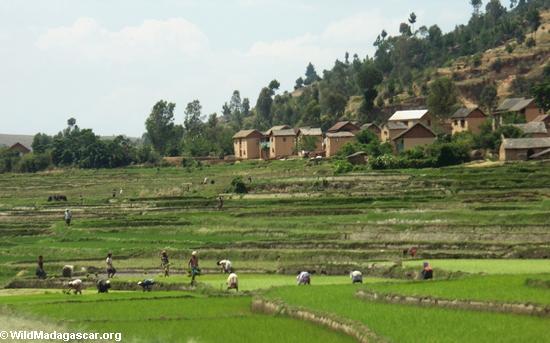"The progress showcased through this report will inform governments, policymakers, NGOs, and donors that seek to curb hunger and poverty, providing a clear roadmap for expanding or replicating these successes elsewhere," said Worldwatch Institute President Christopher Flavin. "We need the world's influencers of agricultural development to commit to longstanding support for farmers, who make up 80 percent of the population in Africa."
The report is a product of Worldwatch Institute's Nourish the Planet program, the aim of which is to assess agricultural innovation by measures of productivity, sustainability, diversity, and ecosystem health. The report brought together the insight of the world's foremost agricultural experts with analysis of hundreds of innovations already being implemented to produce 15 proven, sustainable, comprehensive ways to reduce poverty and hunger worldwide.
An example can be found in the local foods movement. Serving locally raised crops in schools has been shown to be a successful strategy in many African nations, and is similar to successful farm-to-cafeteria programs in the United States and Europe.
 Photo by Rhett A. Butler
Photo by Rhett A. ButlerMalagasy working in the rice fields of central Madagascar.
"The international community has been neglecting entire segments of the food system in its efforts to reduce hunger and poverty," said Danielle Nierenberg, co-director of Worldwatch's Nourishing the Planet project. "The solutions won't necessarily come from producing more food, but from changing what children eat in schools, how foods are processed and marketed, and what sorts of food businesses we are investing in."
At a time when the global investment in agricultural innovation has dropped from 16 percent to four percent in just two decades, with the global economic downturn expected to lower contributions even more, the SOW report facilitates 'smart spending' by informing governments and foundations about the endeavors which are most likely to produce positive results. In conducting their research, the Worldwatch team talked with farmers and banks alike in order to develop a comprehensive, pragmatic analysis of each of the hundreds of case studies assessed by the project.
The innovations detailed in the report include 'vertical gardening', a method of urban farming which is increasingly practiced in cities throughout Africa and elsewhere around the world. In Kibera, Nairobi, the largest slum in Kenya, more than 1,000 women farmers are growing produce in sacks filled with dirt and pockmarked with holes. The technique is simple, inexpensive, conserves water, and provides a reliable and efficient way to grow food for an African urban populace which is expected to rise to 60 percent by 2050.
In Gambia, 6,000 women organized the TRY Women's Oyster Harvesting cooperative which resulted in a sustainable co-management plan for the local oyster fishery which had been previously environmentally degraded through overharvesting. The Gambian government is now working with groups like TRY to promote, and increase investment in, less-destructive oyster fishery practices.
In South Africa and Kenya, pastoralists are working to preserve indigenous varieties of livestock whose adaptations to the regions' hot and dry conditions are expected to become even more valuable as climate change results in increased aridity. With 15-25 million people relying on livestock, Africa has more permanent pasture and more pastoralists than anywhere else in the world.
An estimated 33 percent of children in Africa are experiencing hunger or malnutrition, a number which is expected to grow to a possible 42 million by 2025. In Uganda, the Developing Innovations in School Cultivation (DISC) program is creating curricula around native vegetable gardening, nutrition education, and cooking skills, in order to teach children how to grow local crops and combat food shortages while revitalizing national culinary traditions.
To learn more about State of the World 2011: Innovations that Nourish the Planet, or to order your own copy, visit http://blogs.worldwatch.org/nourishingtheplanet/
http://news.mongabay.com/2011/0112-morgan_sow_agriculture.html











No comments:
Post a Comment